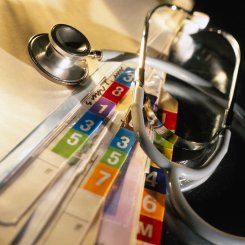
Eighty percent of U.S. doctors say they’re willing to care for patients during a bioterror outbreak of an unknown but potentially deadly illness – provided it’s not too dangerous. But apart from this general willingness, very few feel prepared to help respond to a bioterror attack.
According to a survey of 526 physicians by G. Caleb Alexander and Matthew K. Wynia, of the University of Chicago Hospitals, fewer doctors reported a willingness to treat patients as the threat to their personal safety grew more specific, and only 21 percent said they are well-prepared to help respond to a bioterrorism attack.
The survey results appear in the journal Health Affairs.
The 80 percent who were willing to treat patients came disproportionately from the 55 percent of the physicians who acknowledged a professional obligation to care for patients in epidemics, even if that might endanger their own health. These physicians were significantly more likely to be willing to treat infected patients than those who did not feel such a professional duty.
Professional codes of medical ethics have long supported this “duty to treat.” The American Medical Association, for instance, says that doctors should commit themselves to “applying our knowledge and skills when needed, though doing so may put us at risk.”
But in this survey, overall willingness to treat dropped from 80 percent to just 40 percent when physicians were asked if they would risk contracting a deadly illness to save the lives of others. Only 33 percent said they would treat smallpox patients without having been vaccinated against the virus themselves.
However, real bioterrorism seemed a distant prospect to most of these doctors. Only 15 percent believed their own communities might be struck by a bioterrorist event in the next few years. That unlikelihood, combined with the complexities of learning how to deal with actual bioterror threats, might account for the low sense of preparedness among the respondents.
The authors suggest that providing physicians with instructions for general early response to medical disasters – as simple as where to report in an emergency – might encourage a greater feeling of readiness, even if every physician cannot become an expert on smallpox, anthrax, or other potential source of bioterror infection.
“Preparedness for handling a bioterrorist attack entails more than knowledge,” say Alexander and Wynia. “It requires the willingness to put knowledge to work, perhaps at some risk to oneself.”
Bioterrorism may not be the only case which calls for doctors to act in the face of personal risk. Natural occurrences of epidemic diseases may pose similar dangers.
“Outbreaks of smallpox, viral hemorrhagic fevers, plague and new diseases such as severe acute respiratory syndrome (SARS) could require physicians to act at some risk to their own health,” they say. “The threat of new disease outbreaks, from bioterrorism or natural causes, has provided an opportunity for physicians to rearticulate and reaffirm long-standing ethical principles regarding the duty to treat.”








Comments are closed.